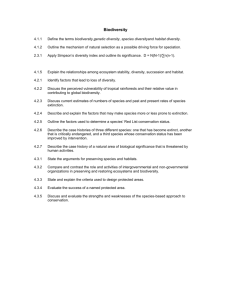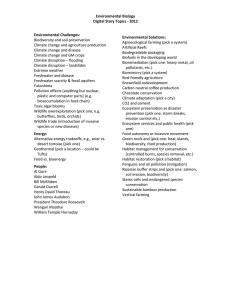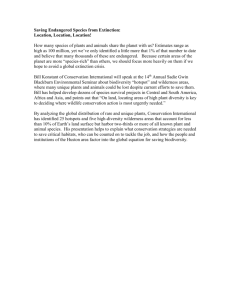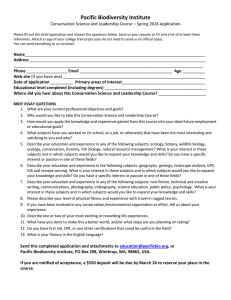18th ANNUAL BIOECON CONFERENCE ON: “Instruments and
advertisement
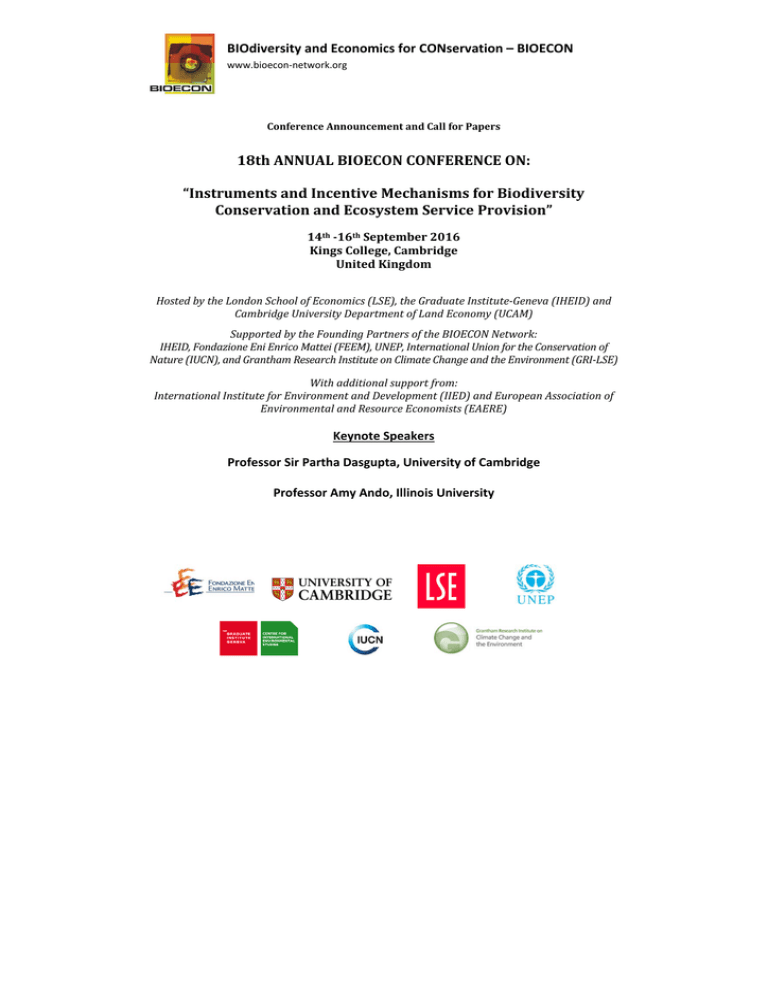
BIOdiversity and Economics for CONservation – BIOECON www.bioecon‐network.org ConferenceAnnouncementandCallforPapers 18thANNUALBIOECONCONFERENCEON: “InstrumentsandIncentiveMechanismsforBiodiversity ConservationandEcosystemServiceProvision” 14th‐16thSeptember2016 KingsCollege,Cambridge UnitedKingdom HostedbytheLondonSchoolofEconomics(LSE),theGraduateInstitute‐Geneva(IHEID)and CambridgeUniversityDepartmentofLandEconomy(UCAM) SupportedbytheFoundingPartnersoftheBIOECONNetwork: IHEID,FondazioneEniEnricoMattei(FEEM),UNEP,InternationalUnionfortheConservationof Nature(IUCN),andGranthamResearchInstituteonClimateChangeandtheEnvironment(GRI‐LSE) Withadditionalsupportfrom: InternationalInstituteforEnvironmentandDevelopment(IIED)andEuropeanAssociationof EnvironmentalandResourceEconomists(EAERE) Keynote Speakers Professor Sir Partha Dasgupta, University of Cambridge Professor Amy Ando, Illinois University The Scientific Partners of BIOECON are pleased to announce the Eighteenth Annual International BIOECON conference on the theme of “Instruments and Incentive Mechanisms for Biodiversity Conservation and Ecosystem Service Provision”. The conference will be held at Kings College Cambridge, England between the 14th – 16th September 2016. BIOECON 18 will be of interest to both researchers and policy makers working on issues in the area of biodiversity, ecosystem services, and sustainable development, in both developed and developing countries. In particular, we wish to explore the latest theoretical and empirical research on instruments and incentive mechanisms. The conference aims to present evidence on which instruments have worked and research on new instruments and incentive mechanisms that offer potential improvements or refinements on the existing toolkit. For instance, can conservation and environmental objectives be achieved via Conditional Cash/Social Transfers? How can Payments for Ecosystem Services be scaled‐up from their current limited applications? What instruments can assist in conserving biodiversity as part of natural capital? The conference welcomes work on developed and developing country experiences. The conference takes a broad interest in the area of resource management, development and conservation, including but not limited to: the role of biodiversity and ecosystem services in economic development, plant genetic resources and food security issues, deforestation and development, fisheries and institutional adaptation, development and conservation, wildlife conservation, and international trade and regulation. The conference will have sessions on economic development, growth and biodiversity conservation, as well as on institutions and institutional change pertaining to the management of living resources. For a flavour of previous conferences go to BIOECON 16 and BIOECON 17. In particular, submissions are invited on the themes of: - Evaluation of biodiversity‐related policies Institutional frameworks for resource conservation (property rights, market instruments etc.) The role of behavioural economics in biodiversity conservation policy design Experimental (lab and field) approaches to biodiversity and ecosystem service conservation Institution‐building for provision of global public goods Valuation methodology and its application to biodiversity conservation Issues of governance and management of natural resources in developing countries Development, growth and resource constraints Resources management, distribution, development, poverty alleviation. BIOECON also has the goal of influencing policy‐makers and policy. To this end two expert policy panels will be organised. The purpose of these panels will be to bring together practitioners (Government, private sector, NGO) and academics from different disciplines to discuss current policy related issues in biodiversity conservation and environment. The panel sessions will be supported by and contribute to the aims and goals of and the funding partners: UNEP, IUCN and IIED. This year UNEP and IIED will be co‐organising a panel discussion on the potential for Conditional Cash Transfers to secure ecosystem services and conservation objectives, in light of the recently agreed UN Sustainable Development Objectives (SDGs). Complete papers may be submitted for presentation within the conference and only complete papers will be considered by the scientific programme committee. Electronic copies should be sent to Ms Kristel Suijs at bioecon@bioecon‐network.org no later than Monday 23rd May 2016. Please include Abstract, JEL Codes and Keywords with your submission. Acceptance of papers will be notified by email by Monday 6th June 2016. Unfortunately late papers cannot be considered. It is also possible to submit 3‐4 papers together as a suggested “special session” under one of the themes indicated above. The Scientific Partners reserve the right to accept papers on an individual basis, so it is possible that even when a session is not accepted, individual papers within the session might be so. This year we would also like to receive suggestions for a special “natural sciences” or interdisciplinary parallel session to foster more interdisciplinary collaboration with the BIOECON network. Sessions proposed should focus on any aspect of biodiversity conservation and ecosystem services. The conference will open with a reception at Kings College on early evening of Wednesday 14th of September. Conference sessions will commence on the morning of the 15th of September and conclude on the afternoon of the 16th of September. The conference banquet will take place at the main Dining Hall of Kings College on the evening of the 15th of September. Selected presenters will be invited to register one presenter for the conference at the “invited presenter” rate. The invited presenter rate consists of a £140 registration fee that will cover the costs of 2 nights single accommodation, reception, lunches, and conference banquet. (A limited number of double rooms are available (at a surcharge of £50/night). Additional guests may be registered for lunch (£35/person) or the Conference Banquet at the additional cost of £50 per guest. There is a £250 registration fee for all other participants that will include the banquet, lunches and refreshments, but not accommodation. There is a £130 registration fee for day‐participants (that includes lunches and refreshments but not lodging and the conference banquet). All other questions regarding fees, registrations and accommodation should be sent to Ms Kristel Suijs at bioecon@bioecon‐network.org. Registration will open on Tuesday 7th June 2016. Registrations for conference presenters are due by 24th June 2016. Registration for all other participants closes on the 22nd August 2016. Further registration details and all other conference information will be provided on the BIOECON web‐ site at www.bioecon‐network.org.
